compare的用法
c语言compare的用法
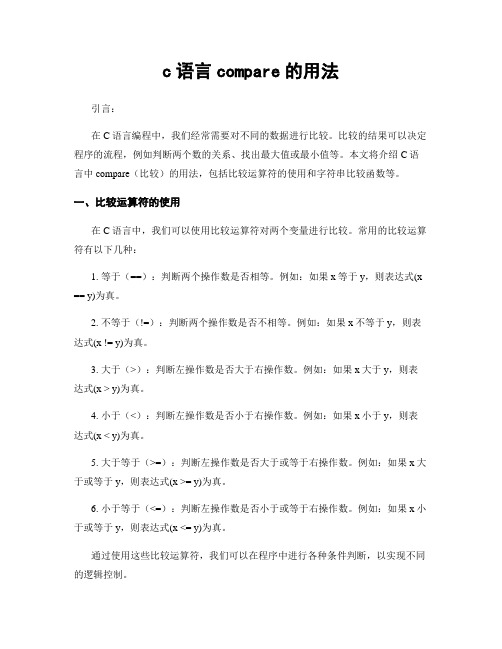
c语言compare的用法引言:在C语言编程中,我们经常需要对不同的数据进行比较。
比较的结果可以决定程序的流程,例如判断两个数的关系、找出最大值或最小值等。
本文将介绍C语言中compare(比较)的用法,包括比较运算符的使用和字符串比较函数等。
一、比较运算符的使用在C语言中,我们可以使用比较运算符对两个变量进行比较。
常用的比较运算符有以下几种:1. 等于(==):判断两个操作数是否相等。
例如:如果x等于y,则表达式(x == y)为真。
2. 不等于(!=):判断两个操作数是否不相等。
例如:如果x不等于y,则表达式(x != y)为真。
3. 大于(>):判断左操作数是否大于右操作数。
例如:如果x大于y,则表达式(x > y)为真。
4. 小于(<):判断左操作数是否小于右操作数。
例如:如果x小于y,则表达式(x < y)为真。
5. 大于等于(>=):判断左操作数是否大于或等于右操作数。
例如:如果x大于或等于y,则表达式(x >= y)为真。
6. 小于等于(<=):判断左操作数是否小于或等于右操作数。
例如:如果x小于或等于y,则表达式(x <= y)为真。
通过使用这些比较运算符,我们可以在程序中进行各种条件判断,以实现不同的逻辑控制。
二、字符串比较函数除了对数值型数据进行比较外,C语言还提供了字符串比较函数用于对字符串进行比较。
常用的字符串比较函数有以下两种:1. strcmp函数:strcmp函数用于比较两个字符串的大小。
它接受两个参数,分别是要比较的字符串str1和str2。
该函数会返回一个整数值,表示两个字符串的相对大小关系。
具体规则如下:- 如果str1大于str2,则返回正数。
- 如果str1小于str2,则返回负数。
- 如果str1等于str2,则返回0。
下面是一个使用strcmp函数的例子:```c#include <stdio.h>#include <string.h>int main() {char str1[] = "Hello";char str2[] = "World";int result = strcmp(str1, str2);if(result > 0) {printf("str1大于str2");} else if(result < 0) {printf("str1小于str2");} else {printf("两个字符串相等");}return 0;}```输出结果为:“str1小于str2”。
compare的用法及例句
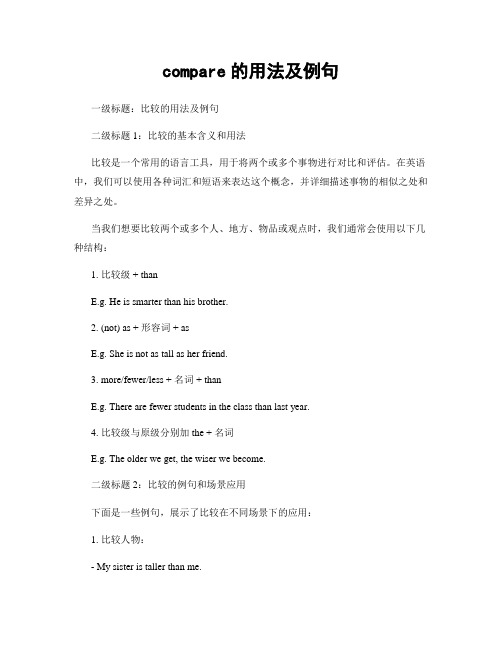
compare的用法及例句一级标题:比较的用法及例句二级标题1:比较的基本含义和用法比较是一个常用的语言工具,用于将两个或多个事物进行对比和评估。
在英语中,我们可以使用各种词汇和短语来表达这个概念,并详细描述事物的相似之处和差异之处。
当我们想要比较两个或多个人、地方、物品或观点时,我们通常会使用以下几种结构:1. 比较级 + thanE.g. He is smarter than his brother.2. (not) as + 形容词 + asE.g. She is not as tall as her friend.3. more/fewer/less + 名词 + thanE.g. There are fewer students in the class than last year.4. 比较级与原级分别加the + 名词E.g. The older we get, the wiser we become.二级标题2:比较的例句和场景应用下面是一些例句,展示了比较在不同场景下的应用:1. 比较人物:- My sister is taller than me.- John is funnier than Mark.- She speaks English better than her classmates.2. 比较地点:- New York City is bigger than Boston.- The temperature in Miami is hotter than in Seattle.- Tokyo has a larger population compared to Osaka.3. 比较物品:- The red shirt is more expensive than the blue one.- This car is faster but less fuel-efficient than the hybrid model.- The new smartphone has a better camera than the previous model.4. 比较观点:- Some people believe that money brings happiness, while others think it doesn't.- The benefits of exercising regularly outweigh the drawbacks for most people.- In terms of taste, I prefer homemade food over restaurant meals.5. 比较数量:- We have fewer students in our class this semester compared to last year.- The company had more sales in the second quarter than in the first quarter.- He has less free time now that he has taken on additional responsibilities.比较还可以用来做超过两个事物的对比。
英语词汇(145)compare、contrast
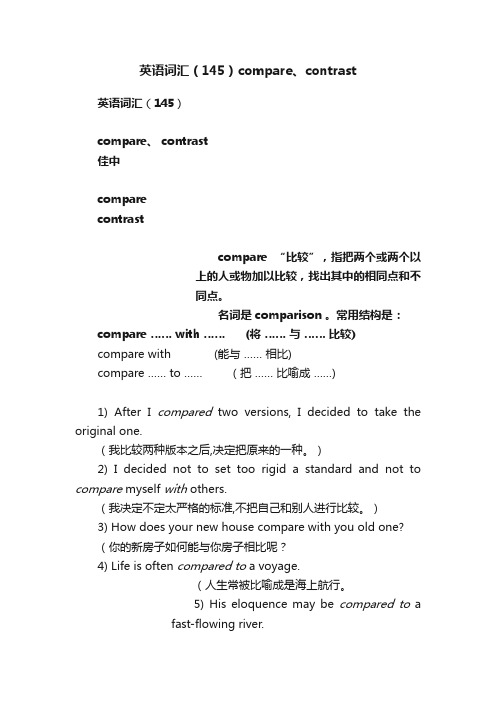
英语词汇(145)compare、contrast 英语词汇(145)compare、 contrast佳中comparecontrastcompare “比较”,指把两个或两个以上的人或物加以比较,找出其中的相同点和不同点。
名词是 comparison 。
常用结构是:compare …… with …… (将……与……比较)compare with (能与……相比)compare …… to …… (把……比喻成……)1) After I compared two versions, I decided to take the original one.(我比较两种版本之后,决定把原来的一种。
)2) I decided not to set too rigid a standard and not to compare myself with others.(我决定不定太严格的标准,不把自己和别人进行比较。
)3) How does your new house compare with you old one?(你的新房子如何能与你房子相比呢?4) Life is often compared to a voyage.(人生常被比喻成是海上航行。
5) His eloquence may be compared to afast-flowing river.(他的口才好比水流湍急的河流。
)contrast “对照”,指把两种东西进行对比、对照。
从而找出相异之处。
可用作动词或名词,常用结构是:动词contrast wit …….. (与……对照)名词contrast to ……. (与……对照)1) This cold weather contrasts with last week’s heat.(这冷天气同上星期的热天气成想鲜明对比。
)2) His elegant clothes contrast sharply with his rough speech.His elegant clothes are a sharp contrast to his rough speech.(他华丽的衣服与他的粗糙的语言形成强烈的对比。
compare的用法、句型与搭配
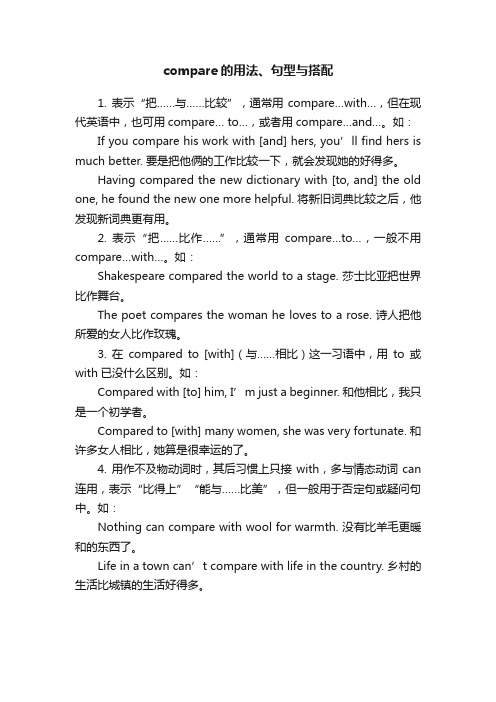
compare的用法、句型与搭配1. 表示“把……与……比较”,通常用compare…with…,但在现代英语中,也可用compare… to…,或者用compare…and…。
如:If you compare his work with [and] hers, you’ll find hers is much better. 要是把他俩的工作比较一下,就会发现她的好得多。
Having compared the new dictionary with [to, and] the old one, he found the new one more helpful. 将新旧词典比较之后,他发现新词典更有用。
2. 表示“把……比作……”,通常用compare…to…,一般不用compare…with…。
如:Shakespeare compared the world to a stage. 莎士比亚把世界比作舞台。
The poet compares the woman he loves to a rose. 诗人把他所爱的女人比作玫瑰。
3. 在compared to [with](与……相比)这一习语中,用to或with已没什么区别。
如:Compared with [to] him, I’m just a beginner. 和他相比,我只是一个初学者。
Compared to [with] many women, she was very fortunate. 和许多女人相比,她算是很幸运的了。
4. 用作不及物动词时,其后习惯上只接with,多与情态动词can 连用,表示“比得上”“能与……比美”,但一般用于否定句或疑问句中。
如:Nothing can compare with wool for warmth. 没有比羊毛更暖和的东西了。
Life in a town can’t compare with life in the country. 乡村的生活比城镇的生活好得多。
compare函数
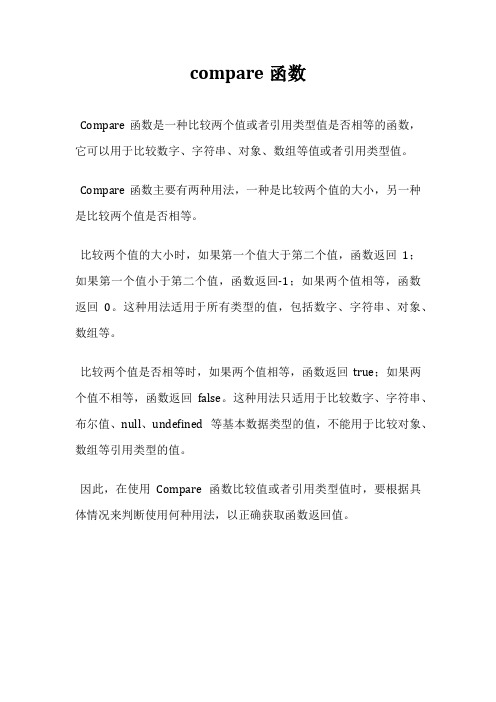
compare函数
Compare函数是一种比较两个值或者引用类型值是否相等的函数,它可以用于比较数字、字符串、对象、数组等值或者引用类型值。
Compare函数主要有两种用法,一种是比较两个值的大小,另一种是比较两个值是否相等。
比较两个值的大小时,如果第一个值大于第二个值,函数返回1;如果第一个值小于第二个值,函数返回-1;如果两个值相等,函数返回0。
这种用法适用于所有类型的值,包括数字、字符串、对象、数组等。
比较两个值是否相等时,如果两个值相等,函数返回true;如果两个值不相等,函数返回false。
这种用法只适用于比较数字、字符串、布尔值、null、undefined等基本数据类型的值,不能用于比较对象、数组等引用类型的值。
因此,在使用Compare函数比较值或者引用类型值时,要根据具体情况来判断使用何种用法,以正确获取函数返回值。
compare 的两个重要词组区别

compare to 和compare with 的区别是什么Compare to 是“把……比作”的意思。
例如:We compare him to a little tiger. 我们把他比作小老虎。
The last days before liberation are often compared to the darkness before the dawn. 将要解放的那些日子常常被比作黎明前的黑暗。
Compare ... with 是“把……和……比较”的意思。
例如:We must compare the present with the past. 我们要把现在和过去比较一下。
We compared the translation with the original. 我们把译文和原文比较了下。
从上面比较可以看出,compare with 侧重一个仔细的比较过程。
有时,两者都可以互相代替。
例如:He compared London to (with) Paris. 他把伦敦比作巴黎。
London is large, compared to (with) Paris. 同巴黎比较而言,伦敦大些。
在表示“比不上”、“不能比”的意思时,用compare with 和compare to 都可以。
例如:My spoken English can't be compared with yours. 我的口语比不上你的。
The pen is not compared to that one. 这笔比不上那支。
1、c ompare…to…意为“把…比作”,即把两件事物相比较的同时,发现某些方面相似的地方。
这两件被比较的事物或人在本质方面往往是截然不同的事物。
如:He compared the girl to the moon in the poem.他在诗中把那姑娘比作月亮。
2、compare…with…“与…相比,把两件事情相比较,从中找出异同”,这两件事又往往是同类的,如:I'm afraid my English compares poorly with hers.恐怕我的英语同她的英语相比要差得多。
compare用法总结精讲
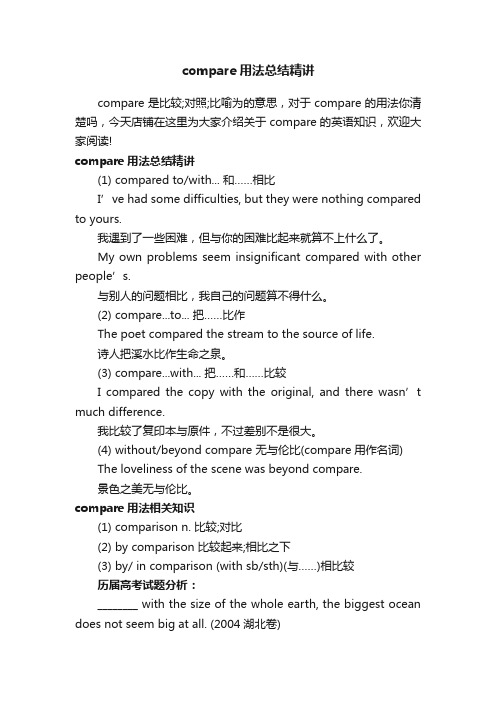
compare用法总结精讲compare是比较;对照;比喻为的意思,对于compare的用法你清楚吗,今天店铺在这里为大家介绍关于compare的英语知识,欢迎大家阅读!compare用法总结精讲(1) compared to/with... 和……相比I’ve had some difficulties, but they were nothing compared to yours.我遇到了一些困难,但与你的困难比起来就算不上什么了。
My own problems seem insignificant compared with other people’s.与别人的问题相比,我自己的问题算不得什么。
(2) compare...to... 把……比作The poet compared the stream to the source of life.诗人把溪水比作生命之泉。
(3) compare...with... 把……和……比较I compared the copy with the original, and there wasn’t much difference.我比较了复印本与原件,不过差别不是很大。
(4) without/beyond compare 无与伦比(compare用作名词)The loveliness of the scene was beyond compare.景色之美无与伦比。
compare用法相关知识(1) comparison n. 比较;对比(2) by comparison 比较起来;相比之下(3) by/ in comparison (with sb/sth)(与……)相比较历届高考试题分析:________ with the size of the whole earth, the biggest ocean does not seem big at all. (2004湖北卷)A. CompareB. When comparingC. ComparingD. When compared【分析】该题考查状语从句的省略及动词compare的用法。
compare的用法和例句

compare的用法和例句一、了解"compare"的基本用法及其在句子中的不同位置在英语中,动词"compare"用于比较两个或多个事物之间的相似性或差异。
它可以作为及物动词,后接名词、代词或动名词作宾语;也可以是不及物动词,后接介词短语构成状语从句。
1. "Compare"作为及物动词当"compare"作为及物动词时,常与名词、代词或动名词连用,并通过介绍类似性和差异来进行对比。
例句1: I compared the two smartphones before making a decision. (我在做决定之前将这两款智能手机进行了对比。
)例句2:She compared her English skills with her sister's and realized she needed more practice.(她将自己的英语技能与姐姐的进行了比较,并意识到自己需要更多的练习。
)在上述例句中,我们可以观察到"compare + 宾语"的结构。
这种结构可以帮助读者理解作者正在比较两个主体之间的相似点和不同点。
2. "Compare"作为不及物动词当"compare"作为不及物动词时,通常会后接一个以介词开头的短语来表示对比的参照物。
例句3:He compared the prices in different stores and found the best deal. (他对不同商店的价格进行了比较,并找到了最好的交易。
)例句4:We can compare this situation to a sinking ship, with everyone desperately trying to keep afloat.(我们可以将这种情况比作一艘正在下沉的船,每个人都在拼命地想办法保持浮出水面。
2019年6月英语四级语法用法辨析:compare用法与搭配
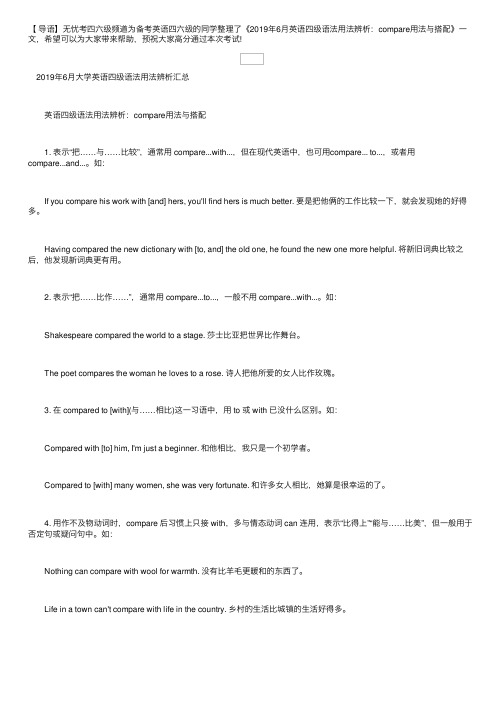
【导语】⽆忧考四六级频道为备考英语四六级的同学整理了《2019年6⽉英语四级语法⽤法辨析:compare⽤法与搭配》⼀⽂,希望可以为⼤家带来帮助,预祝⼤家⾼分通过本次考试! 2019年6⽉⼤学英语四级语法⽤法辨析汇总 英语四级语法⽤法辨析:compare⽤法与搭配 1. 表⽰“把……与……⽐较”,通常⽤ compare...with...,但在现代英语中,也可⽤compare... to...,或者⽤compare...and...。
如: If you compare his work with [and] hers, you'll find hers is much better. 要是把他俩的⼯作⽐较⼀下,就会发现她的好得多。
Having compared the new dictionary with [to, and] the old one, he found the new one more helpful. 将新旧词典⽐较之后,他发现新词典更有⽤。
2. 表⽰“把……⽐作……”,通常⽤ compare...to...,⼀般不⽤ compare...with...。
如: Shakespeare compared the world to a stage. 莎⼠⽐亚把世界⽐作舞台。
The poet compares the woman he loves to a rose. 诗⼈把他所爱的⼥⼈⽐作玫瑰。
3. 在 compared to [with](与……相⽐)这⼀习语中,⽤ to 或 with 已没什么区别。
如: Compared with [to] him, I'm just a beginner. 和他相⽐,我只是⼀个初学者。
Compared to [with] many women, she was very fortunate. 和许多⼥⼈相⽐,她算是很幸运的了。
compare to
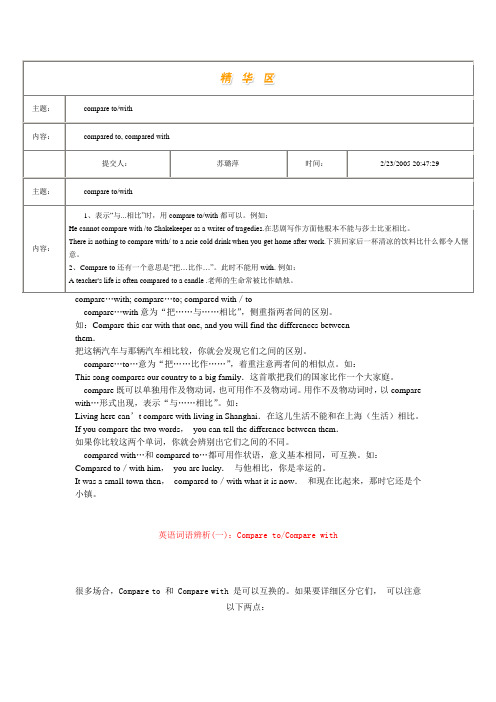
compare…with; compare…to; compared with/tocompare…with意为“把……与……相比”,侧重指两者间的区别。
如:Compare this car with that one, and you will find the differences betweenthem.把这辆汽车与那辆汽车相比较,你就会发现它们之间的区别。
compare…to…意为“把……比作……”,着重注意两者间的相似点。
如:This song compares our country to a big family.这首歌把我们的国家比作一个大家庭。
compare既可以单独用作及物动词,也可用作不及物动词。
用作不及物动词时,以compare with…形式出现,表示“与……相比”。
如:Living here can’t compare with living in Shanghai.在这儿生活不能和在上海(生活)相比。
If you compare the two words,you can tell the difference between them.如果你比较这两个单词,你就会辨别出它们之间的不同。
compared with…和compared to…都可用作状语,意义基本相同,可互换。
如:Compared to/with him,you are lucky.与他相比,你是幸运的。
It was a small town then,compared to/with what it is now.和现在比起来,那时它还是个小镇。
英语词语辨析(一):Compare to/Compare with很多场合,Compare to 和 Compare with 是可以互换的。
如果要详细区分它们,可以注意以下两点:(1) Compare to 强调被比较的人/物/概念中的相似处。
例句-1:The critics compared his work to that of Martin Amis.批评家把他的作品与 Martin Amis的作品相提并论。
compare放在句首的例句
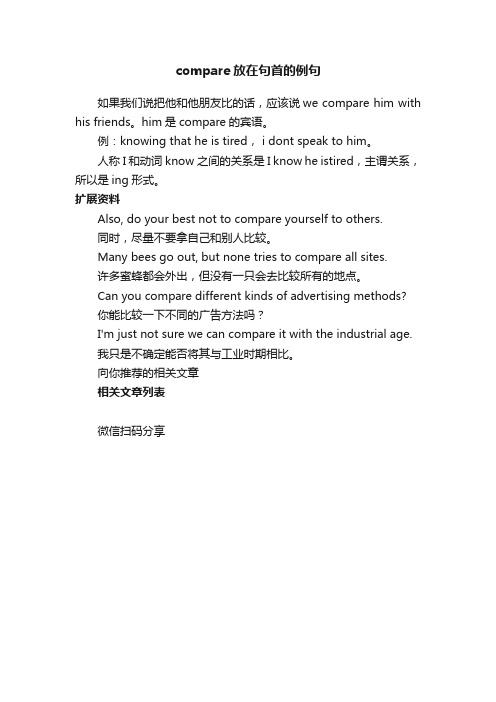
compare放在句首的例句
如果我们说把他和他朋友比的话,应该说we compare him with his friends。
him是compare的宾语。
例:knowing that he is tired, i dont speak to him。
人称I 和动词know之间的关系是I know he istired,主谓关系,所以是ing形式。
扩展资料
Also, do your best not to compare yourself to others.
同时,尽量不要拿自己和别人比较。
Many bees go out, but none tries to compare all sites.
许多蜜蜂都会外出,但没有一只会去比较所有的地点。
Can you compare different kinds of advertising methods?
你能比较一下不同的广告方法吗?
I'm just not sure we can compare it with the industrial age.
我只是不确定能否将其与工业时期相比。
向你推荐的相关文章
相关文章列表
微信扫码分享。
compare的用法
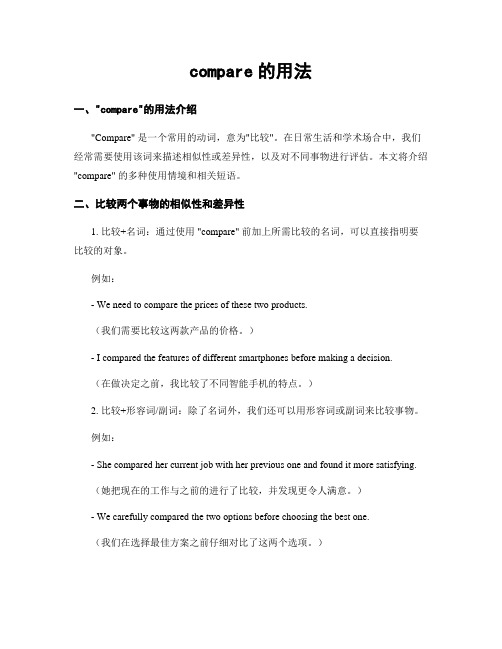
compare的用法一、"compare"的用法介绍"Compare" 是一个常用的动词,意为"比较"。
在日常生活和学术场合中,我们经常需要使用该词来描述相似性或差异性,以及对不同事物进行评估。
本文将介绍"compare" 的多种使用情境和相关短语。
二、比较两个事物的相似性和差异性1. 比较+名词:通过使用 "compare" 前加上所需比较的名词,可以直接指明要比较的对象。
例如:- We need to compare the prices of these two products.(我们需要比较这两款产品的价格。
)- I compared the features of different smartphones before making a decision.(在做决定之前,我比较了不同智能手机的特点。
)2. 比较+形容词/副词:除了名词外,我们还可以用形容词或副词来比较事物。
例如:- She compared her current job with her previous one and found it more satisfying.(她把现在的工作与之前的进行了比较,并发现更令人满意。
)- We carefully compared the two options before choosing the best one.(我们在选择最佳方案之前仔细对比了这两个选项。
)3. 比较+从句:有时候,我们需要对复杂的情况进行比较,这时可以使用从句来提供更多细节。
例如:- I compared the way he solved the problem with my own method and realized his approach was more efficient.(我将他解决问题的方法与我的方法进行了比较,发现他的做法更高效。
compare用法
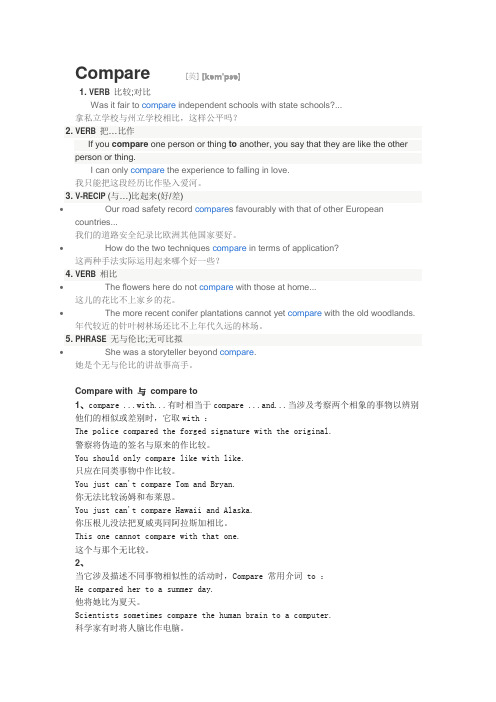
Compare [英] [kəmˈpɛə]1.VERB 比较;对比Was it fair to compare independent schools with state schools?...拿私立学校与州立学校相比,这样公平吗?2.VERB 把…比作If you compare one person or thing to another, you say that they are like the other person or thing.I can only compare the experience to falling in love.我只能把这段经历比作坠入爱河。
3.V-RECIP (与…)比起来(好/差)∙Our road safety record compare s favourably with that of other European countries...我们的道路安全纪录比欧洲其他国家要好。
∙How do the two techniques compare in terms of application?这两种手法实际运用起来哪个好一些?4.VERB 相比∙The flowers here do not compare with those at home...这儿的花比不上家乡的花。
∙The more recent conifer plantations cannot yet compare with the old woodlands.年代较近的针叶树林场还比不上年代久远的林场。
5.PHRASE 无与伦比;无可比拟∙She was a storyteller beyond compare.她是个无与伦比的讲故事高手。
Compare with 与compare to1、compare ...with...有时相当于compare ...and...当涉及考察两个相象的事物以辨别他们的相似或差别时,它取with :The police compared the forged signature with the original.警察将伪造的签名与原来的作比较。
compare
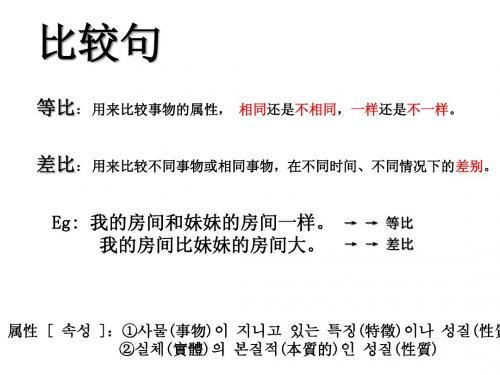
等比:用来比较事物的属性,
相同还是不相同,一样还是不一样。
差比:用来比较不同事物或相同事物,在不同时间、不同情况下的差别。
Eg: 我的房间和妹妹的房间一样。 我的房间比妹妹的房间大。
→ → 等比 → → 差比
属性 [ 속성 ]:①사물(事物)이 지니고 있는 특징(特徵)이나 성질(性質 ②실체(實體)의 본질적(本質的)인 성질(性質)
等比
不多
格式:
A
跟/和同/差
*他喜欢的东西比我相同. *他的汉语水平比以前差不多. *我们国家的习惯比中国的不一样。 *我们国家的气候比北京的不一样。
差比格式:
(1)
(2)
A
A
比
比
B
+ adj + (num/得多/多了/一些/一点儿)
V + 得多 // 多了 // 一些 // 一点儿 )) V + +得 得+ + adj adj (( 得多 多了 一些 一点儿
+ B+
:增加、减少、提前、推迟、延长、提高、下降等表示时 (3) A 比 B + V +num num
(4)
(5)
A
A
比
比
B
B
+ N + V + 得 + adj
+ 有 +抽象名词 +( 得多/多了 )
(6)
A
比 N + 还 + N
【他比女人还女人。】
抽象名词: 추상명사.
在“比”字句中,形容词的修饰词:
可以使用:更、还 等副词。
不可以使用:很、挺、十分、太、格外、比较、最、非常、真 等副词。
compare 的用法
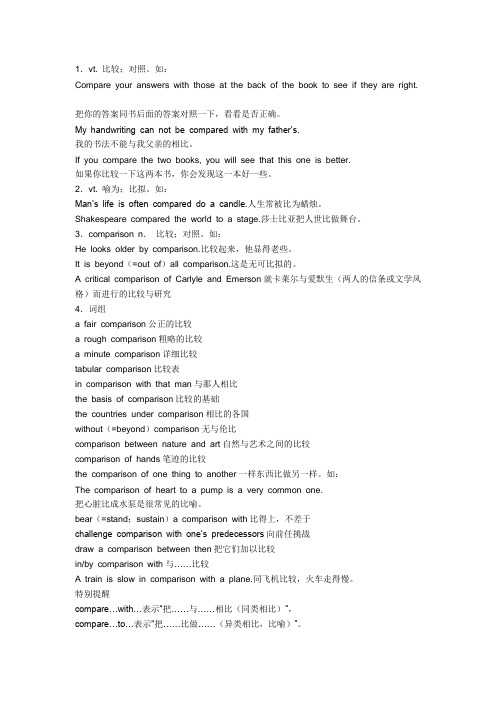
1.vt. 比较;对照。
如:Compare your answers with those at the back of the book to see if they are right.把你的答案同书后面的答案对照一下,看看是否正确。
My handwriting can not be compared with my father’s.我的书法不能与我父亲的相比。
If you compare the two books, you will see that this one is better.如果你比较一下这两本书,你会发现这一本好一些。
2.vt. 喻为;比拟。
如:Man’s life is often compared do a candle.人生常被比为蜡烛。
Shakespeare compared the world to a stage.莎士比亚把人世比做舞台。
3.comparison n.比较;对照。
如:He looks older by comparison.比较起来,他显得老些。
It is beyond(=out of)all comparison.这是无可比拟的。
A critical comparison of Carlyle and Emerson就卡莱尔与爱默生(两人的信条或文学风格)而进行的比较与研究4.词组a fair comparison公正的比较a rough comparison粗略的比较a minute comparison详细比较tabular comparison比较表in comparison with that man与那人相比the basis of comparison比较的基础the countries under comparison相比的各国without(=beyond)comparison无与伦比comparison between nature and art自然与艺术之间的比较comparison of hands笔迹的比较the comparison of one thing to another一样东西比做另一样。
compare的用法

compare的⽤法
compare⽤作动词,表⽰⽐较,对⽐,⽐喻等含义,compare⽤作及物动词时接名词或代词作宾语,⽤作不及物动词时,主动形式常具有被动意义。
⽤作名词表⽰⽐较,对照等含义。
pare的基本意思是“⽐较,对照”,主要⽤于⽐较事物的典型特征及其价值,⽽不在于⽐较相同与不同。
pare⽤作及物动词时接名词或代词作宾语。
Compare the two translations and comment on them.
⽐较⼀下这两种译⽂,然后作评论。
He compared the two chairs before he decided which one to buy.
他⽐较了那两张椅⼦后,才决定买哪⼀张。
3.⽤作不及物动词时,主动形式常具有被动意义。
It is hard to compare.
很难⽐较。
pare接with或to可表⽰“与…相⽐”,接to还可⽤于⽐喻,意为“⽐作”。
接with还可表⽰“⽐得上”,这种⽤法常出现在疑问句或否定句中,且常与can连⽤。
(1)compare with侧重把两个事物进⾏横向⽐较,求其共同之处或不同之处,且多⽤于具体事物;
compare to侧重于把两个事物归纳到同⼀范围⾥去,以便突出其相同的属性,且多⽤于抽象事物。
(2)表⽰“⽐喻,⽐作”的意思时,只能⽤compare to; 表⽰“⽐得上”时,只能⽤compare with。
compare的用法和短语例句

compare的用法和短语例句compare有比较;对比;比喻等意思,那么你知道compare的用法吗?下面跟着店铺一起来学习一下,希望对大家的学习有所帮助!compare的用法:compare的用法1:confirm的基本意思是“证实”“确定”,指以不可辩驳的事实或不容置疑的陈述证实某事的真实性、准确性、正确性以及有效程度,引申可表示为“认可”“坚定”。
compare的用法2:confirm是及物动词,其主语多为人,宾语可以是名词、代词或that从句,也可接以as短语充当补足语的复合宾语。
compare的常用短语:用作动词 (v.)compare to (v.+prep.)compare with (v.+prep.)compare的用法例句:1. He programmed his computer to compare all the possible combinations.他给他的计算机编制了一套程序,以比较所有可能的组合。
2. How do the two techniques compare in terms of application?这两种手法实际运用起来哪个好一些?3. The more recent conifer plantations cannot yet compare with the old woodlands.年代较近的针叶树林场还比不上年代久远的林场。
4. Childcare facilities in Britain compare unfavourably with other European countries.英国的保育设施与欧洲其他国家比起来相形见绌。
5. It's instructive to compare his technique with Alan Bennett's.把他的手法与艾伦·贝内特进行比较很富启发意义。
[compare的用法和例句]compare用法精析 (人教版英语高考复习)
![[compare的用法和例句]compare用法精析 (人教版英语高考复习)](https://img.taocdn.com/s3/m/821142904b35eefdc9d33373.png)
[compare的用法和例句]compare用法精析(人教版英语高考复习)【--高考祝福语】compare用法精析compare v. 比较,对比【用法精析】(1) compared to/with... 和……相比I’ve had some difficulties, but they were nothing compared to yours.我遇到了一些困难,但与你的困难比起来就算不上什么了。
My own problems seem insignificant compared with otherpeople’s.与别人的问题相比,我自己的问题算不得什么。
(2) compare...to... 把……比作The poet compared the stream to the source of life.诗人把溪水比作生命之泉。
(3) compare...with... 把……和……比较I compared the copy with the original, and there wasn’t much difference.我比较了复印本与原件,不过差别不是很大。
(4) without/beyond compare 无与伦比(compare用作名词)The loveliness of the scene was beyond compare.景色之美无与伦比。
【拓展】(1) comparison n. 比较;对比(2) by comparison 比较起来;相比之下(3) by/ in comparison (with sb/sth)(与……)相比较历届高考试题分析:________ with the size of the whole earth, the biggest ocean does not seem big at all. (2004湖北卷)A. CompareB. When comparingC. ComparingD. When compared【分析】该题考查状语从句的省略及动词compare的用法。
- 1、下载文档前请自行甄别文档内容的完整性,平台不提供额外的编辑、内容补充、找答案等附加服务。
- 2、"仅部分预览"的文档,不可在线预览部分如存在完整性等问题,可反馈申请退款(可完整预览的文档不适用该条件!)。
- 3、如文档侵犯您的权益,请联系客服反馈,我们会尽快为您处理(人工客服工作时间:9:00-18:30)。
compare的用法
1. compare 用作vt., 表示“比较”,“对比”,结构为
(1). compare A with B 表示“把A和B作比较”,也用为compare A to/and B
e.g. We carefully compared the first report with the second.
我们仔细比较了第一份报告和第二份报告。
Compared with/to his room, my room is even smaller.
Comparing his room (with my room), I find my room is even smaller.
注意此句中没有with
My own problems seem insignificant compared with other people’s.
与别人的问题相比,我自己的问题算不得什么。
___D___ with the size of the whole earth, the biggest ocean does not seem big at all. (2004湖北卷)
A. Compare
B. When comparing
C. Comparing
D. When compared
(2). compare A to B “将A比作B”
e.g. The old man often compares the young to the sun at 8 or 9 o’clock in the morning.
老人常把年轻人比作早晨八九点钟的太阳。
Young people are compared to the sun at eight or nine in the morning
年轻人经常被比作早上七八点钟的太阳。
2. compare 用作vi.,表示“与…类似/相似”,结构为
compare with/to “比得上”,“可与…相媲美”
e.g. This school compares with the best in the country.
这所学校可以和全国的最好的学校媲美。
This house doesn’t compare with our previous one.
这所房子比不上我们之前的。
3. compare 用作n. , 不可数,常用于惯用语中
beyond/without compare 无与伦比。
